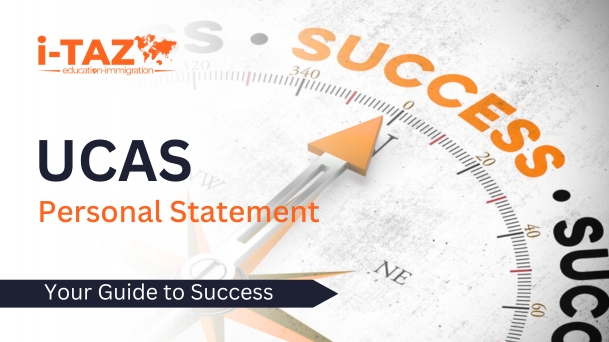Writing a UCAS personal statement is one of the most important steps in applying to UK universities. It’s your opportunity to showcase your personality, skills, and ambitions to admission tutors. Crafting a strong, impactful statement can make a difference in securing a place in your desired program. In this guide, we will break down the process of writing a personal statement that stands out.
What is a UCAS Personal Statement?
A UCAS personal statement is a crucial part of your university application. It’s a 4000-character (or 47-line) essay where you express why you want to study a particular course and why you’re a great candidate. This statement is submitted as part of your UCAS application for undergraduate courses at UK universities.
Why is a UCAS Personal Statement Important?
Your personal statement gives you a chance to stand out among thousands of other applicants. While your grades and academic achievements are significant, the personal statement shows admission tutors your motivations, personality, and enthusiasm for the subject you want to study.

How to Start a UCAS Personal Statement
The hardest part of any writing is getting started. For a personal statement, it’s important to begin with a clear focus on the subject you want to study. Consider the following steps to get started:
Research the Course
Before you start writing, research the course and university thoroughly. Understanding what the program requires will help you highlight the right skills and experiences. Look for specific modules and university values that resonate with your interests.
Brainstorm Your Ideas
Take time to reflect on your motivations. Why do you want to study this subject? What past experiences or achievements demonstrate your passion and skills? List any relevant extracurricular activities, projects, or work experiences.
Create a Structure
Once you have your ideas, it’s time to create a structure. Typically, a personal statement should include an introduction, main body, and conclusion. Each section should serve a purpose and transition smoothly to the next.
Writing the Introduction
Your introduction needs to grab the reader’s attention. Start by briefly explaining why you are passionate about the course you are applying for. Avoid clichés like “I have always been interested in…” Instead, be direct and personal.
Example of a Strong Introduction
If you are applying for a biology course, you could start with an impactful sentence like:
“Exploring the complexities of human biology during my volunteer work in a local clinic confirmed my desire to pursue a degree in biology, as it aligns with my long-term goal of contributing to medical research.”
Discussing Your Academic Interests
The main body of your personal statement should focus on your academic interests. Discuss what excites you about the subject and how your current studies relate to it.
Connect School Subjects to the Course
Mention specific subjects you studied in school or college that sparked your interest. For example, if you are applying for an engineering program, mention how studying physics or mathematics enhanced your problem-solving skills.
Showcase Your Enthusiasm for Learning
Let the admissions team know that you’re eager to learn and grow. Explain any additional reading or research you have done outside of the classroom. Highlight any projects you’ve undertaken that align with the course you’re applying for.

Highlighting Relevant Experience
Universities love to see how you’ve applied your knowledge in real-world situations. This could be through work experience, internships, volunteering, or extracurricular activities.
Work Experience and Internships
If you have any work experience relevant to your course, include it here. Be specific about what you learned and how it has prepared you for university.
Example:
“During my summer internship at a local architectural firm, I gained hands-on experience using design software, which solidified my decision to study architecture at a higher level.”
Extracurricular Activities
Your extracurricular activities can demonstrate key skills like leadership, teamwork, and time management. For example, if you led a sports team, you can mention how this experience taught you to work under pressure, which will help in your university studies.
Discussing Transferable Skills
Universities are looking for well-rounded individuals. Even if some of your experiences aren’t directly related to your chosen course, you can still talk about the transferable skills you’ve gained.
Communication and Teamwork Skills
Whether you’ve worked in a part-time job or participated in group projects at school, explain how these experiences have helped you develop skills that will benefit you in university.
Example:
“My part-time job as a sales assistant helped me develop effective communication skills and taught me how to handle challenging situations, both of which will be invaluable in group discussions and presentations at university.”
Time Management and Organisation
Balancing schoolwork, extracurricular activities, and a social life requires good time management. Universities want students who can manage their workload effectively.
Example:
“Balancing my studies with volunteering at a local charity has helped me improve my time management skills, ensuring that I meet deadlines without compromising on quality.”
Demonstrating Passion and Commitment
Admission tutors want to see genuine enthusiasm for the subject. Explain why you’re passionate about this field and what you hope to achieve in the future.
Personal Projects
If you have undertaken any independent projects related to your course, now is the time to highlight them. This could be anything from starting a blog on a topic of interest to conducting a small research project in your free time.
Long-Term Goals
Explain how studying this course will help you achieve your long-term career goals. Whether it’s pursuing a specific profession or contributing to a particular field, show the admissions team that you have a clear vision for your future.
Writing the Conclusion
The conclusion of your personal statement should tie everything together. Summarize why you’re an ideal candidate for the course and how the university will help you achieve your ambitions. Avoid introducing new information in this section. Keep it clear, concise, and confident.
Example of a Strong Conclusion
“A degree in business management will equip me with the essential skills to launch my own sustainable business in the future. I am excited about the opportunity to learn from leading professionals at your university and to contribute my knowledge and enthusiasm to the student community.”
Common Mistakes to Avoid
While writing your personal statement, be mindful of some common pitfalls.
Avoid Clichés
Avoid overused phrases like “I have always wanted to be…” or “From a young age, I’ve been passionate about…” Instead, be unique and original in expressing your enthusiasm.
Don’t Overuse Complex Words
Keep your language simple and clear. Don’t feel the need to use complex or overly academic words, as clarity is more important than showing off your vocabulary.
Proofread and Edit
Spelling mistakes and grammatical errors can leave a bad impression. Always proofread your personal statement and ask someone else to review it before submission.
Frequently Asked Questions About UCAS Personal Statements
How long should my UCAS personal statement be?
Your UCAS personal statement should be no more than 4000 characters or 47 lines, whichever comes first.
Can I use the same personal statement for different courses?
It’s important to tailor your personal statement to the specific course you’re applying for. While you may apply to similar courses, make sure your statement is relevant to all of them.
How should I format my personal statement?
There’s no need for fancy formatting. Your personal statement will be submitted as plain text, so focus on the content rather than formatting.
Final Thoughts on Writing a UCAS Personal Statement
Writing a UCAS personal statement might seem daunting, but with the right approach, you can create a compelling and memorable essay. Remember to focus on your passion for the subject, highlight your experiences, and keep your structure clear and engaging. By following the tips outlined in this guide, you’ll be one step closer to securing your spot at your dream university.









